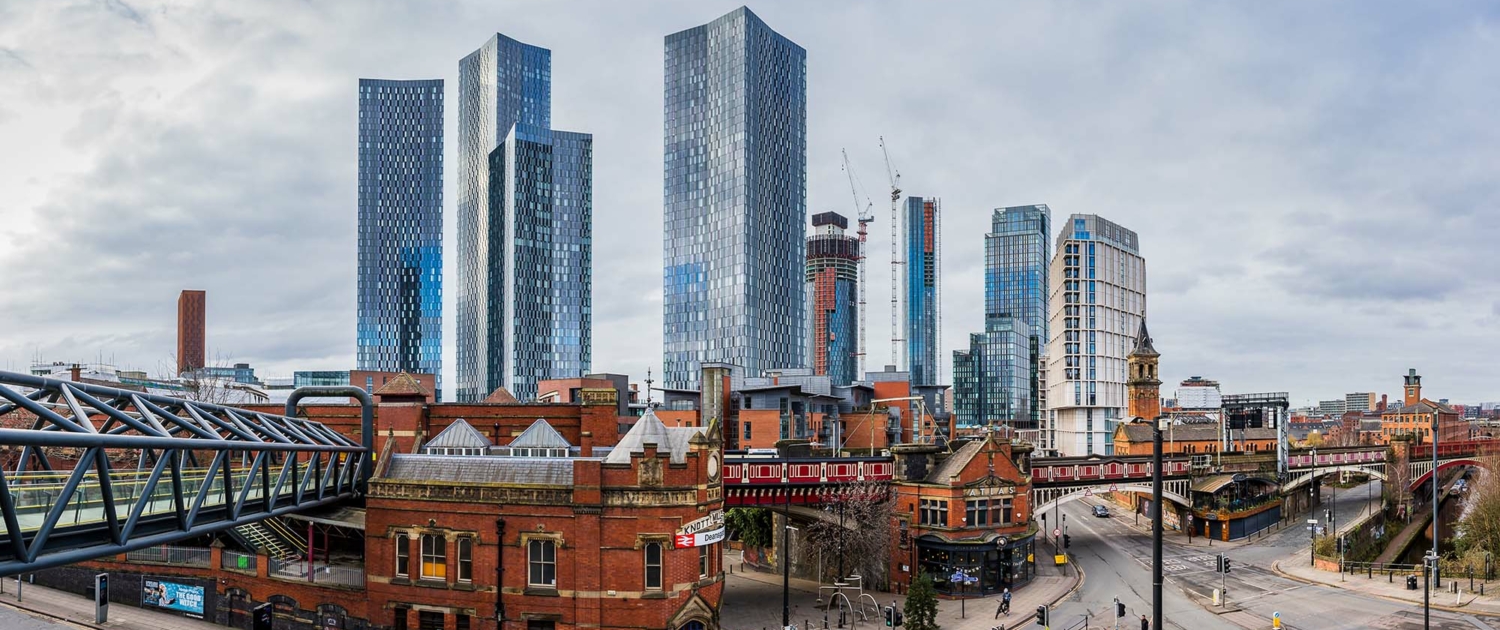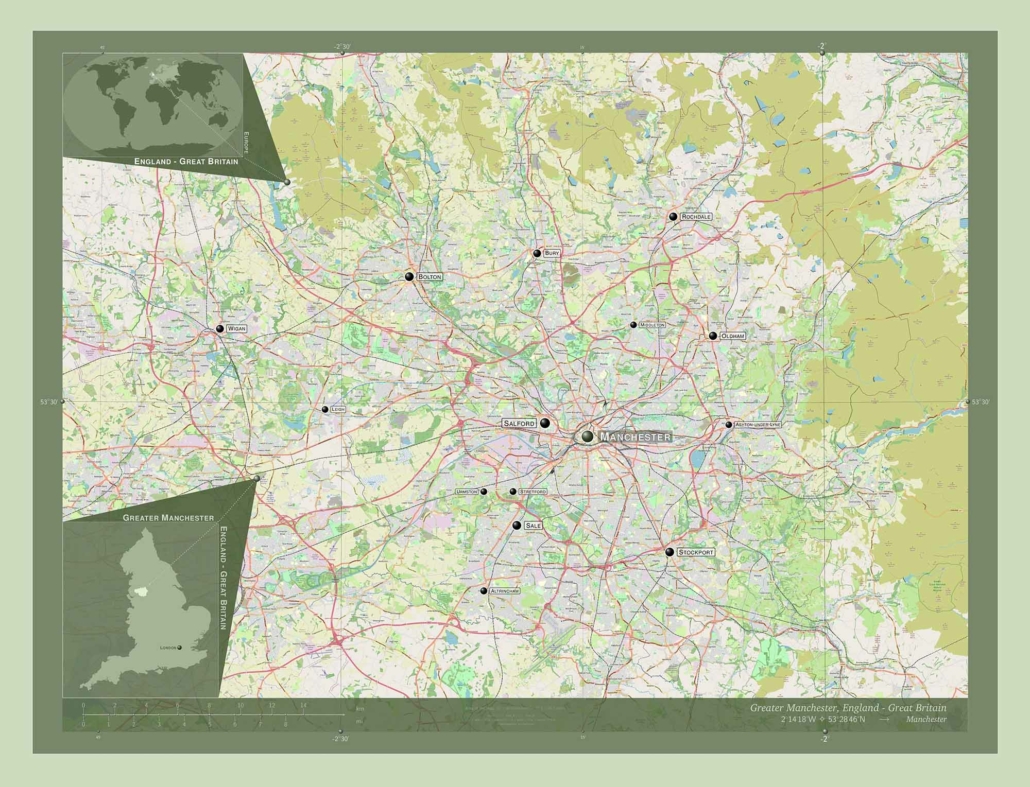The Location and Importance of a Major City in the UK
Home > Manchester Case Study > What is the location and importance of Manchester?
What is the location and importance of Manchester?
What is the location of Manchester?
Manchester is located in the northwest of England. It is roughly 160 miles northwest of London and is close to other major cities such as Liverpool and Birmingham. Several rivers flow through the city, including the River Mersey, which connects Manchester and Liverpool.
Between the last two censuses (held in 2011 and 2021), Manchester’s population increased by 9.7%, from just over 503,100 in 2011 to around 551,900 in 2021. Manchester has a relatively young population, with almost 62,000 20-24-year-olds living there. It has a very high population density, with 4,773 residents per square kilometre.
Manchester was a reasonably small town until the early 1800s, when it grew rapidly. The unplanned growth was due to the growth of textile manufacturing during the Industrial Revolution. Manchester was designated city status in 1853 and became the world’s first industrialised city.
The worker bee has been the symbol of Manchester for over 250 years since the Industrial Revolution. It represents the idea that the city was built from the ground by its hardworking people. Bees can be spotted throughout the city on post-boxes, bins, benches, the face of the Kimpton Clocktower and the flooring in Manchester Town Hall. More recently, the bee symbol and other bee-related art have appeared on the sides of buildings, in metal sculptures and as part of the city’s regeneration. Following the Manchester Arena terrorist attack in 2017, the symbol was widely shared on social media after the atrocity, which killed 22 and injured dozens more. The bee quickly symbolised the city’s unity against hate and terrorism.
What is the importance of Manchester in the UK?
Economic importance: Manchester accounts for 10% of all employment in the UK and approximately 7% of all financial service outputs. However, Manchester expects to see the third-fastest economic growth in the UK between 2024 and 2026.
Education importance: Manchester has two major universities – The University of Manchester and Manchester Metropolitan University. However, many much smaller education facilities exist, such as the University of Law and the Royal Northern College of Music. Within the area, there is also the University of Bolton and the University of Salford.
Cultural importance: Manchester is known as the music capital of the UK. Not only is it home to a range of venues for music, such as the AO Arena, The Etihad and Old Trafford Cricket Ground, but many bands such as The Stone Roses, The 1975, Oasis, The Happy Mondays and The Smiths originated in Manchester.
Manchester is also famous for its wide range of sports teams and facilities. In 2002, Manchester was home to the Common Wealth Games and has state-of-the-art facilities for a range of sports, including the Manchester Velodrome and the Manchester Squash Centre—both home to the England Teams training facilities. Manchester is also home to Manchester United and Manchester City, and the clubs and their fans bring in a considerable amount of money to the city each year.
Historical importance: Manchester became known as ‘Cottonopolis’ as the textile industry became its primary source of income. The climate in Manchester didn’t allow the country to grow cotton, so developing a transport network was essential. In 1894, the Manchester Ship Canal opened and linked the city with the Irish Sea, increasing the ease of transporting raw and finished materials around the UK. The canal terminated in Old Trafford, and a vast industrial area developed as the industry grew alongside the canal.
The railway was another critical advancement in Manchester’s history, and the creation of the world’s first intercity railway line helped raise the profile. The Liverpool and Manchester Railway opened in 1830, and Victoria Station is one of the oldest working stations in the world.
• Transportational importance: As mentioned above, Manchester is important because of the development of the first intercity railway line. The Manchester Metrolink opened in 1992 and is the city’s most popular public transport option. Plans to introduce a clean air zone in the city to reduce air pollution are currently on hold.
Manchester Airport is the busiest outside of London, attracting over 19 million passengers per year who fly to over 200 destinations. A cargo operation helps transport trade worldwide.
What is the importance of Manchester in the wider world?
Economic Importance: Manchester is an important global city, and Spinningfields is home to the city’s financial services. Banks such as RBS, HSBC, and Barclays have their UK headquarters there, along with international banks such as BNY Mellon. In 2019, Manchester exported £14.9bn worth of goods worldwide, equating to 18% of the total GDP.
Cultural Importance: In addition to its worldwide music and sports scene, Manchester is home to the BBC and ITV studios. Programmes like Coronation Street are famous worldwide and depict life in Manchester (maybe not always accurately).
Environmental Importance: Manchester plans to become a UK Carbon Zero city by 2038.
Historical Importance: Manchester was the heart of the Industrial Revolution and, during the early 1900s, was the leading producer of cotton and textiles. These were exported around the world.
Quiz
Related Topics
Use the images below to explore related GeoTopics.




